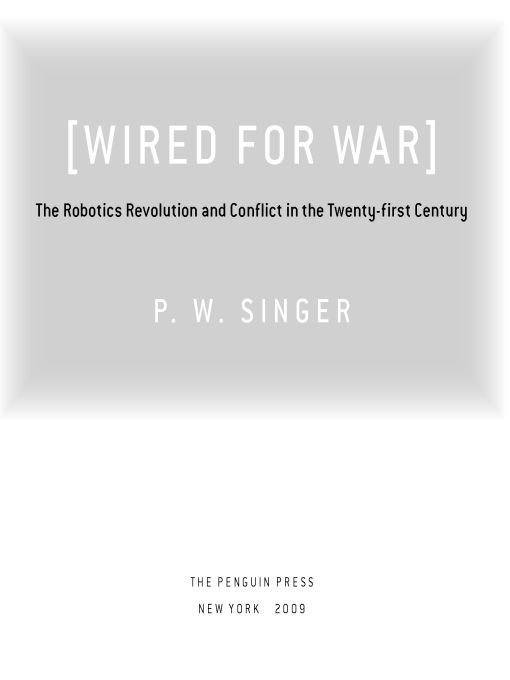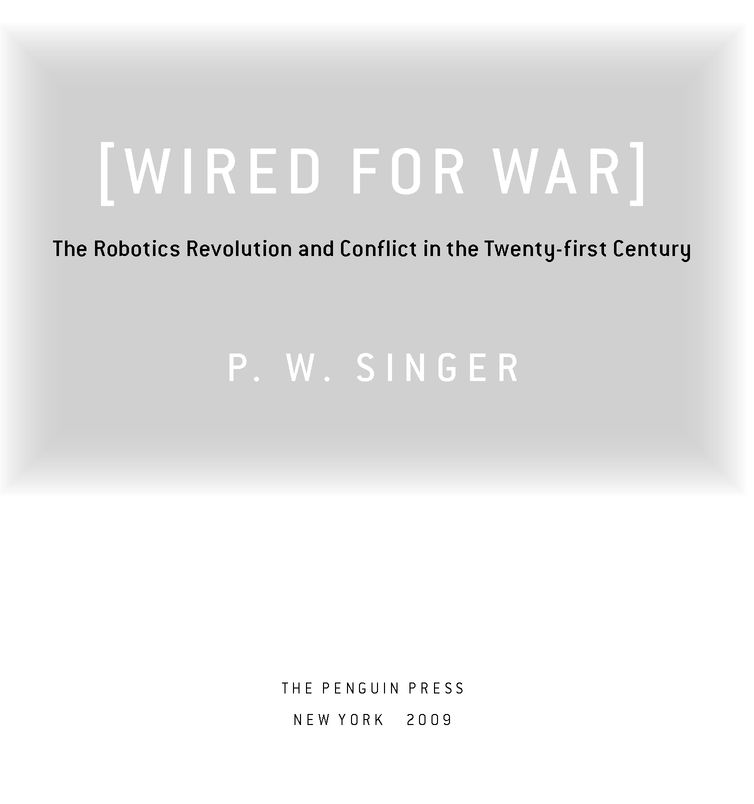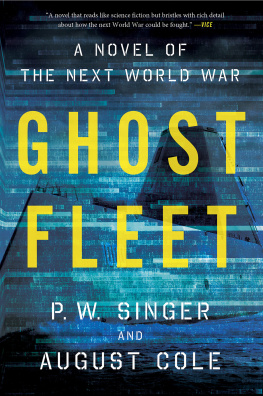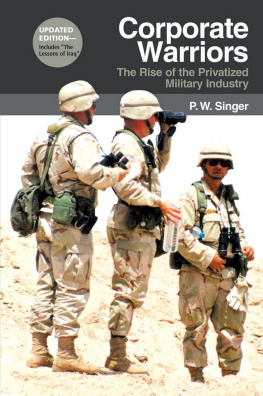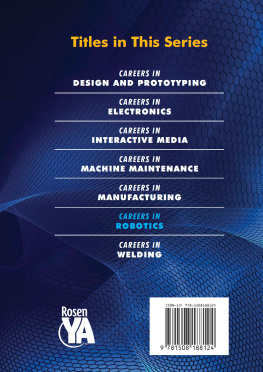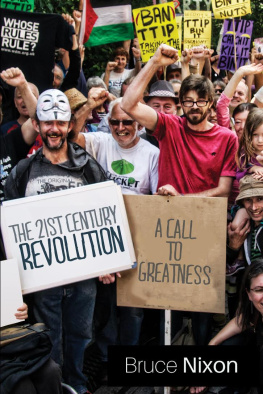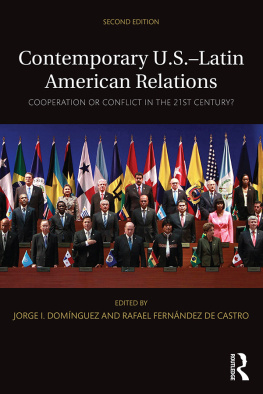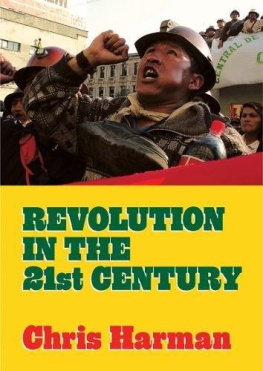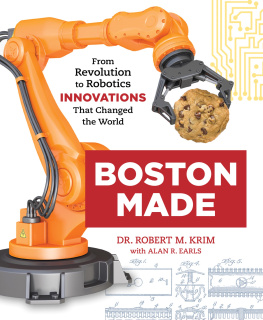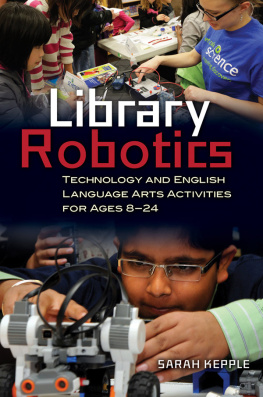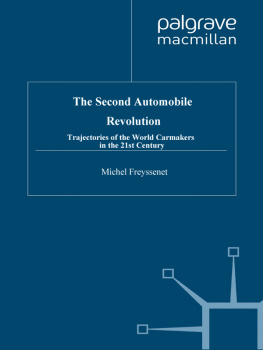Table of Contents
ALSO BY P. W. SINGER
Children at War
Corporate Warriors:
The Rise of the Privatized Military Industry
This is your last chance. After this, there is no turning back. You take the blue pillthe story ends, you wake up in your bed and believe whatever you want to believe. You take the red pillyou stay in Wonderland and I show you how deep the rabbit-hole goes. Remember that all I am offering is the truth. Nothing more.
Larry and Andy Wachowski, The Matrix, 1999
[AUTHORS NOTE]
WHY A BOOK ON ROBOTS AND WAR?
Those people who think they know everything are a great annoyance to those of us who do.
ISAAC ASIMOV
Because robots are frakin cool.
Thats the short answer to why someone would spend four years researching and writing a book on new technologies and war. The long answer is a bit more complex.
As my family will surely attest, I was a bit of an odd kid. All kids develop their hobbies and even fixations, be it baseball cards or Barbie dolls. Indeed, I have yet to meet a six-year-old boy who did not have an encyclopedic knowledge of all things dinosaur. For me growing up, it was war. I could be more polite and say military history, but it was really just war. In saying the same about his childhood, the great historian John Keegan wrote, It is not a phrase to be written, still less spoken with any complacency. But it is true nonetheless.
Perhaps the reason lies in the fact that the generations before me had all served in the military. They left several lifetimes worth of artifacts hidden around the house for me to pilfer and play with, whether it was my dads old military medals and unit insignia, which I would take out and pin to my soccer jersey, or the model of the F-4 Phantom jet fighter that my uncle had flown over Vietnam, which I would run up and down the stairs on its missions to bomb Legoland.
But the greatest treasure trove of all was at my grandparents house. My grandfather passed away when I was six, too young to remember him as much more than the kindly man whom we would visit at the nursing home. But I think he may have influenced this aspect of me the most.
Chalmers Rankin Carr, forever just Granddaddy to me, was a U.S. Navy captain who served in World War II. Like all those from what we now call the Greatest Generation, he was one of the giants who saved the world. Almost every family gathering would include some tale from his or my grandmothers (Maw Maw to us grandkids) experiences at war or on the home front.
Its almost a clich to say, but the one that stands out is the Pearl Harbor story; although, as with all things in my family, it comes with a twist. On December 7, 1941, my grandfather was serving in the Pacific Fleet on a navy transport ship. For three months after the Pearl Harbor attack, the family didnt hear any word from him and worried for the worst. When his ship finally came back to port (it had actually sailed out of Pearl Harbor just two days before the attack), he immediately called home to tell his wife (my grandmother) and the rest of his family that he was okay. There were only two problems: he had called collect, and that side of my family is Scotch-Irish. No one would accept the charges. While my grandfather cursed the phone operators ear off, in the way that only a sailor can, on the other end the family explained to the operator that since he was calling, he must be alive. So there was no reason to waste money on such a luxury as a long-distance phone call.
Granddaddys study was filled with volume after volume of great books, on everything from the history of the U.S. Navy to biographies of Civil War generals. I would often sneak off to this room, pull out one of the volumes, and lose myself in the past. These books shaped me then and stay with me now. One of my most prized possessions is an original-edition 1939 Janes Fighting Ships that my grandfather received as a gift from a Royal Navy officer, for being part of the crew that shipped a Lend-Lease destroyer to the Brits. As I type these very words, it peers down at me from the shelf above my computer.
My reading fare quickly diverged from that of the other kids at Myers Park Elementary School. A typical afternoon reading was less likely to be exploring how Encyclopedia Brown, Boy Detective, cracked The Case of the Missing Roller Skates than how Audie Murphy, the youngest soldier ever to win the Medal of Honor, went, as he wrote in his autobiography, To Hell and Back. War soon morphed over into the imaginary world that surrounds all kids like a bubble. Other kids went to Narnia, I went to Normandy. While it may have looked like a normal Diamondback dirt bike, my bicycle was the only one in the neighborhood that mounted twin .50-caliber machine guns on the handlebars, to shoot down any marauding Japanese Zeros that dared to ambush me on my way to school each morning. I still remember my mother yelling at me for digging a five-foot-deep foxhole in our backyard when I was ten years old. She clearly failed to understand the importance of setting up a proper line of defense.
I certainly cant claim to have been a normal kid, but in my defense, you also have to remember the context. To be so focused on war was somewhat easier in that period. It was the Reagan era and the cold war had heated back up. The Russians wouldnt come to our Olympics and we wouldnt go to theirs, the military was cool again, and we had no questions about whether we were the good guys. Most important, as a young Patrick Swayze and Charlie Sheen taught us in Red Dawn, not only were the Commies poised to parachute right into our schools, but it was likely us kids who would have to beat them back.
What I find interesting, and a sign of the power of Hollywoods marketing machine, is that usually some artifact from science fiction is in the background of these memories, intertwined with the history. For example, when I think back to my childhood bedroom, there are the model warships from my grandfathers era lined up on display, but also Luke, Leia, Han, and Chewbacca peeking up from my Star Wars bedsheets.
As most of science fiction involved some good guy battling some bad guy in a world far, far away, the two memes of my fantasy world went together fairly well. In short, your author was the kind of little boy to whom a stick was not a mere piece of wood, but the makings of a machine gun or a lightsaber that could save the world from both Hitler and Darth Vader.
WAR! WHAT IS IT GOOD FOR?
I look back on these memories with some embarrassment, but also guilt. Of course, even then, I knew that people die in war and many soldiers didnt come home, but they were always only the buddy of the hero, oddly enough usually from Brooklyn in most World War II movies. The reality of war had no way of sinking in.
It was not until years later that I truly understood the human costs of war. I remember crossing a jury-rigged bridge into Mostar, a town in Bosnia that saw some of the worst fighting in the Yugoslav civil war. I was there as part of a fact-finding mission on the UN peacekeeping operation. Weeks of back-and-forth fighting had turned block after block of factories and apartments on the riverfront into a mass of hollowed-out hulks. The pictures of World War IIs Stalingrad in an old book on my grandfathers shelf had sprung up to surround and encompass me. The books never had any smell other than dust, but here, even well after the battles, a burnt, fetid scent still hung in the air. Down the river were the remnants of an elegant 500-year-old bridge, which had been blasted to pieces by Serb artillery. The people, though, were the ones who drove it home. Haunted is the only adjective I can think of to describe the faces of the refugees.

